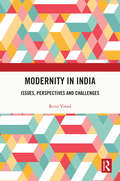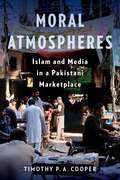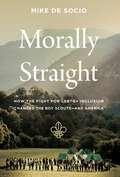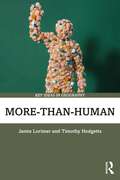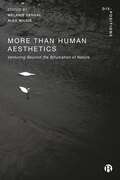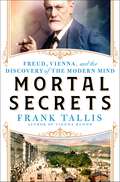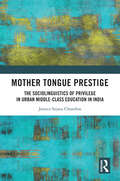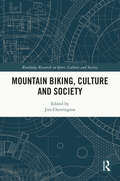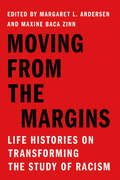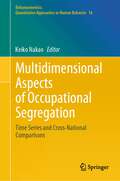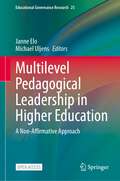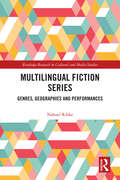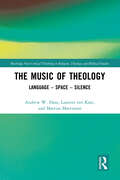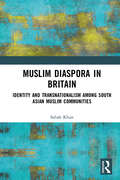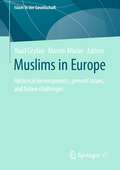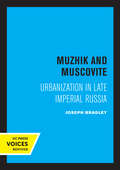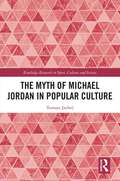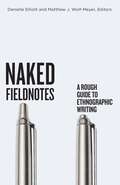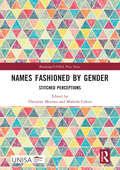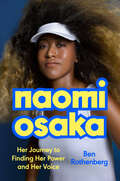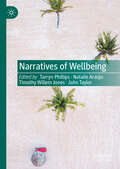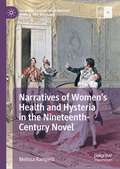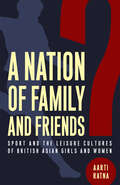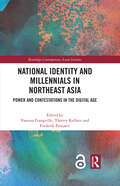- Table View
- List View
Modernity in India: Issues, Perspectives and Challenges
by Renu VinodThis book introduces a sociological understanding of the emergence of modernity in India and its ramifications on society, economy, and polity. It outlines the main features and context of modernity, as described in classical and later texts of modernity. The essays examine the transformation of Indian society as a consequence of the British colonial encounter resulting in social, economic, and political interventions. It also delineates the Indian context by defining the term community, and its close association with caste and religion, and subsequently examines the challenges in building a pan-Indian or national consciousness with a sense of ‘we-ness’ or common identity. Most importantly, the book also studies the politics of government formation after independence, and the role of dominant castes and classes in gaining power at the Centre. The book concludes with an outline of the definitions and historical practices of social exclusion in India, their contemporary configurations, the image of a socially, economically, and politically exclusive Indian modernity that poses challenges to the Indian state and civil society on account of the exclusion of multiple groups. This book would be useful to the students, researchers and teachers of sociology, women and gender studies, history, economics, political science, and other interdisciplinary courses in social sciences. The book will also be valuable reading for those interested in South Asian studies, especially post-colonial contemporary Indian society.
Monsoon Marketplace: Capitalism, Media, and Modernity in Manila and Singapore
by Elmo GonzagaProvides vivid accounts of commercial and leisure spaces that captivated the public imagination in the past but have since been destroyed, forgotten, or refurbished.Monsoon Marketplace uncovers the entangled vernacular cultures of capitalist modernity, mass consumption, and media spectatorship in two understudied postcolonial Asian cities across three crucial historical moments. Juxtaposing Manila and Singapore, it analyzes print and audiovisual representations of popular commercial and leisure spaces during the colonial occupation in the 1930s, national development in the 1960s, and neoliberal globalization in the 2000s. Engaging with the work of creators including Nick Joaquin, Kevin Kwan, and P. Ramlee, it discusses figures of female shoppers in 1930s Manila, languid expatriates in 1930s Singapore, street hawkers in 1960s Singapore, youthful activists in 1960s Manila, call center agents in 2000s Manila, and super-rich investors in 2000s Singapore. Looking at the historical transformation of Calle Escolta, Avenida Rizal, Raffles Place, and Orchard Road, it focuses on Crystal Arcade, the Manila Carnival, the Great World and New World Amusement Parks, and Change Alley, all of which had once captivated the public imagination but have since vanished from the cityscape. Instead of treating capitalism, media, and modernity as overarching systems or processes, the book examines how their configurations and experiences are contingent, variable, pluralistic, and archipelagic. Diverging from critical theories and cultural studies that see consumerism and spectatorship as sources of alienation, docility, and fantasy, it explores how they create new possibilities for agency, collectivity, and resistance.
Moral Atmospheres: Islam and Media in a Pakistani Marketplace (Religion, Culture, and Public Life #51)
by Timothy P. CooperLahore’s Hall Road is the largest electronics market in Pakistan. Once the center of film and media piracy in South Asia, it now specializes in smartphones and accessories. For Hall Road’s traders, conflicts between the economic promises and the moral dangers of film loom large. To reconcile their secular trade with their responsibilities as devoted Muslims, they often look to adjudicate the good or bad moral “atmosphere” (mahaul) that can cling to film and media.Timothy P. A. Cooper examines the diverse and coexisting moral atmospheres that surround media in Pakistan, tracing public understandings of ethical life and showing how they influence economic behavior. Drawing on extensive ethnographic work among traders, consumers, collectors, archivists, cinephiles, and cinephobes, Moral Atmospheres explores varied views on what the relationship between film and faith should look, sound, and feel like for Pakistan’s Muslim-majority public. Cooper considers the preservation and censorship of film in and outside of the state bureaucracy, contestations surrounding heritage and urban infrastructure, and the production and circulation of sound and video recordings among the country’s religious minorities. He argues that a focus on atmosphere provides ways of seeing moral thresholds as mutable and affective, rather than as fixed ethical standpoints. At once a vivid ethnography of a market street and a generative theorization of atmosphere, this book offers fresh perspectives on moral experience and the relationship between religion and media.
Morally Straight: How the Fight for LGBTQ+ Inclusion Changed the Boy Scouts?and America
by Mike De SocioThis deeply-reported narrative illuminates the battle for LGBTQ+ inclusion in the Boy Scouts of America, a decades-long struggle led by teenagers, parents, activists, and everyday Americans.Weaving in his own experience as a scout and journalist, Mike De Socio&’s Morally Straight tells a story that plays out over the course of nearly forty years, beginning in an era when gay rights were little more than a cultural sideshow; when same-sex marriage was not even on the radar; and when much of the country was recommitting to conservative social mores. It was during this treacherous time that accidental activists emerged, challenging one of America&’s most iconic institutions in a struggle that would forever change the country&’s view of gay people and the rights they held in society. In Morally Straight we meet James Dale, the poster child of Scouting who took his fight for inclusion to the Supreme Court; Steven Cozza, the 12-year-old scout in California who started a movement for inclusion called Scouting for All; Jennifer Tyrrell, the lesbian den mother whose expulsion from the Scouts reignited the gay membership controversy; Zach Wahls, the son of lesbian moms who led the final push for policy change; and an array of other previously unknown Scouters who played smaller—but no less crucial—roles in the fight for full inclusion. Richly reported and filled with unforgettable people, Morally Straight braids together these characters and brings to life their collective struggle. This is an essential narrative in the American LGBTQ+ rights movement, and a truly American story about the fight for a better future for our nation&’s bedrock youth organization.
More-than-Human (ISSN)
by Jamie Lorimer Timothy HodgettsThis text offers the first book-length introduction to more-than-human geography, exploring its key ideas, main debates, and future prospects.An opening chapter traces the origins and emergence of this field of enquiry and positions more-than-human geography as a response to a set of intellectual and political crises in Western thought and politics. It identifies key literatures and thinkers and reflects on the varying usages and meanings of the idea of the more-than-human. Three subsequent sections explore cross-cutting themes that draw together the disparate strands of more-than-human geography: examining new materialisms developed in the field, analysing knowledge practices and methodologies, and finally reflecting on the political and ethical implications of a more-than-human approach. A final chapter examines the tensions between this approach and cognate work in environmental geography to review the strengths and the limitations of more-than-human geographies, and to speculate as to their near future development.Introducing the key idea of more-than-human geography, this book will be an important resource for undergraduate and postgraduate students of human geography, environmental geography, cultural and social geography, and political geography.
More-Than-Human Aesthetics: Venturing Beyond the Bifurcation of Nature (Dis-positions: Troubling Methods and Theory in STS)
by Mike Michael Michael Halewood Thomas P. Keating Alexander Damianos Michael L. Thomas Martin Savransky Cecile Malaspina Maximilian Haas Matthew Fuller Andy Goffey Didier Debaise Nicholas GaskillDrawing on the philosophies of Alfred North Whitehead and Félix Guattari, this book develops aesthetics as central to all more-than-human forms of experience, including knowledge practices. Each contribution invites readers on an adventure to explore how this broader view of aesthetics can reshape areas including biomedicine, geological forensics, nuclear waste, race, as well as arts and education. This is an agenda-setting contribution to understanding the significance of aesthetics in science and technology studies, as well social and cultural research more broadly.
Mortal Secrets: Freud, Vienna, and the Discovery of the Modern Mind
by Frank TallisA chronicle of Vienna's Golden Age and the influence of Sigmund Freud on the modern world by a clinical psychologist whose mystery novels form the basis of PBS's Vienna Blood series. Some cities are like stars. When the conditions are right, they ignite, and burn with such fierce intensity that they outshine every other city on the planet. Vienna was one such city and, at the beginning of the twentieth century, was the birthplace of the modern mind and the way we live today. Long coffee menus and celebrity interviews are Viennese inventions. ‘Modern’ buildings were appearing in Vienna long before they started appearing in New York and the idea of practical modern home design originated in the work of Viennese architect Adolf Loos. The place, however, where one finds the most indelible and profound impression of Viennese influence is inside your head. How we think about ourselves has been largely determined by Vienna’s most celebrated resident, Sigmund Freud.In Mortal Secrets, Frank Tallis brilliantly illuminates Sigmund Freud and his times, taking readers into the mind of one of the most influential thinkers of the twentieth century, chronicling the evolution of psychoanalysis and opening up Freud’s life to embrace the Vienna he lived in and the lives of the people he mingled with from Gustav Klimt to Arnold Schönberg, Egon Schiele to Gustav Mahler. Mortal Secrets is a thrilling book about a heady time in one of the world’s most beautiful cities and its long shadow that extends through the twentieth century up until the present day.
Mother Tongue Prestige: The Sociolinguistics of Privilege in Urban Middle-Class Education in India
by Jessica Sujata ChandrasThis book studies the intersection of language and social privilege in education in India. Drawing on rich ethnographic detail and primary data, it introduces a conversation of privilege, specifically contemporary configurations of caste and socioeconomic class in India, to the fields of South Asian studies and sociolinguistic educational studies. The author examines how and why education at the pre-primary, secondary, and higher education levels in India remains largely segregated by socioeconomic class and caste through the lens of language. She advances fields of study of multilingual education, language ideologies, and complexities between language and identity to contribute to work on language and privilege in education by providing a novel and contemporary case from India. The book also critiques contemporary caste configurations in India that uphold urban middle-class Brahmins as the socially privileged purveyors of social and linguistic norms. Mother Tongue Prestige parses out threads of motivation, perceptions of education, and aspirations tied to language use and learning that shape generations of students in an educational system preparing them for a globalized workforce and urban, multilingual livelihoods in India and abroad. It will be indispensable for students and researchers of education, language, sociology, sociology of education, linguistics, sociolinguistics, South Asian studies.
Mountain Biking, Culture and Society (Routledge Research in Sport, Culture and Society)
by Jim CherringtonThis book represents the first critical examination of the social, cultural, and political significance of mountain biking in contemporary societies. Starting from the premise that cultures of mountain biking are diverse, complex, and at times contradictory, this book offers practical and theoretical insights into a range of embodied, material, and socio-technical relationships. Featuring contributions from an interdisciplinary team of researchers, artists, and (Indigenous) community members with backgrounds in sociology, anthropology, cultural studies, community development, and coaching, chapters critically unpack the complex and contested nature of mountain biking identities, bodies, environments, and inequalities within specific settings. Via a range of international case studies from England, Scotland, America, Canada, New Zealand, and South Africa, authors highlight how tensions and conflicts in the world of mountain biking initiate important conversations about climate change, colonialism, discrimination, and land-use. This is essential reading for academics and practitioners in sociology, cultural studies, sport-for-development, and human geography.
Moving from the Margins: Life Histories on Transforming the Study of Racism (Stanford Studies in Comparative Race and Ethnicity)
by Margaret L. Andersen and Maxine Baca ZinnAt a time when movements for racial justice are front and center in U.S. national politics, this book provides essential new understanding to the study of race, its influence on people's lives, and what we can do to address the persistent and foundational American problem of systemic racism. Knowledge about race and racism changes as social and historical conditions evolve, as different generations of scholars experience unique societal conditions, and as new voices from those who have previously been kept at the margins have challenged us to reconceive our thinking about race and ethnicity. In this collection of essays by prominent sociologists whose work has transformed the understanding of race and ethnicity, each reflects on their career and how their personal experiences have shaped their contribution to understanding racism, both in scholarly and public debate. Merging biography, memoir, and sociohistorical analysis, these essays provide vital insight into the influence of race on people's perspectives and opportunities both inside and outside of academia, and how racial inequality is felt, experienced, and confronted.
Multidimensional Aspects of Occupational Segregation: Time Series and Cross-National Comparisons (Behaviormetrics: Quantitative Approaches to Human Behavior #18)
by Keiko NakaoOne of the strengths of this book is that it expresses occupational segregation from multidimensional viewpoints using correspondence analysis. Through a quantitative approach, the book examines occupational segregation by education and gender in response to industrial transformation in Japan and other countries. The transformation of industrial structure, such as post-industrialization, demands a reconsideration of traditional perspectives in sociology, especially in social stratification. In other words, it is a shift from the attribute to the achievement principle. Higher technological innovations will create higher levels of industries, and those industries will require jobs that need greater human capital. In short, the meritocracy will be promoted. Meritocracy is certainly considered persuasive. In fact, previous researchers have looked primarily at a person’s occupation as a measure of social status. In Japan, jobs are normally acquired after completing education; thus, one’s educational achievement plays an important role. Especially in recent years, however, education alone has not been enough to explain social status. This book, therefore, focuses on occupational segregation by gender in addition to education in post-industrial society. Can occupational segregation by gender be weakened in the highly educated group? Is this a universal story in modern society? Because post-industrialization is part of the larger story of modernization, international perspectives are needed to examine the linkage between education and gender occupational segregation. This book explores occupational segregation by gender in response to industrial transformation in Japan and other countries.
Multilevel Pedagogical Leadership in Higher Education: A Non-Affirmative Approach (Educational Governance Research #25)
by Janne Elo Michael UljensThis Open Access book addresses the theoretical grounding of the pedagogical dimensions of higher education leadership and its empirical study. The book’s general point of departure is that educational leadership is a multi-level phenomenon, operating as policy work on a transnational and national level, as educational leadership on various organizational levels, and as supervision and teaching on an interactional level. It is in and through these discursive practices that policies are initiated, interpreted, translated and enacted. The volume demonstrates how Non Affirmative Theory (NAT) of education applies to understanding and dealing with the pedagogical dimensions of the multi-level and multi-actor phenomena of HE leadership in a coherent manner. It allows one to explore how the pedagogical scope of action at each level of leadership is framed or staged by the other levels, as well as how actors at different levels utilise their scope. The book starts out by exploring the pedagogical aspects of HE leadership as a multi-level and multi-actor phenomenon at a theoretical level. It continues to discuss nation state HE in a global perspective, and HE leadership in an organisational perspective. Next, the book looks at departmental leadership, management and development. Parallel with this, the volume critically explores the non-affirmative position itself by a contrasting dialogue with other theoretical approaches.
Multilingual Fiction Series: Genres, Geographies and Performances (Routledge Research in Cultural and Media Studies)
by Nahuel RibkeThis book explores the emergence and development of multilingual fiction series, a relatively new phenomenon propelled by the globalization of media industries and the consolidation of streaming platforms as central vectors in the production and consumption of audiovisual entertainment content. Through a detailed analysis of thriller, sitcom, and drama series, the book proposes an original qualitative and quantitative research methodology for the study of on-screen multilingual encounters, examining the relationship between multilingual speech and genre conventions. The book covers fiction series beyond English-speaking countries: alongside American productions, the analysis covers TV shows from Europe, Latin America, and the Middle East region. This interdisciplinary and original volume will interest scholars and students in film studies and media studies working on global media, as well as communication studies, television studies, sociolinguistics, media and cultural industries, and translation studies.
The Music of Theology: Language – Space – Silence (Routledge New Critical Thinking in Religion, Theology and Biblical Studies)
by Andrew Hass Mattias Martinson Laurens ten KateThis book reconceives theology as a musical endeavour in critical tension with language, space and silence. An Overture first moves us from music to religion, and then from theology back to music – a circularity that, drawing upon history, sociology, phenomenology, and philosophy, disclaims any theology of music and instead pursues the music in theology. The chapters that follow explore the three central themes by way of theory, music and myth: Adorno, Benjamin and Deleuze (language), Derrida, Rosa and Nancy (space), Schelling/Hegel, Homer and Cage (silence). In overdubbing each other, these chapters work towards theology as a sonorous rhythm between loss and freedom. A Coda provides three brief musical examples – Thomas Tallis, György Ligeti, and Evan Parker – as manifestations of this rhythm, to show in summary how music becomes the very pulse of theology, and theology the very intuition of music. The authors offer an interdisciplinary engagement addressing fundamental questions of the self and the other, of humanity and the divine, in a deconstruction of modern culture and of its bias towards the eye over the ear. The book harmonizes three scholarly voices who attempt to find where the resonance of our Western conceptions and practice, musically and theologically, might resound anew as a more expansive music of theology.
Muslim Diaspora in Britain: Identity and Transnationalism among South Asian Muslim Communities
by Sabah KhanThis book explores the idea of Muslim diaspora in context of Muslim communities in the United Kingdom. It critically looks at the notion of ummah and presents a comprehensive account of South Asian Muslims in London. Employing qualitative research methods and drawing on extensive fieldwork, it delves into the identification and transnational connections of Muslims in Britain. It shows the ways in which religious identity, practices and experiences may instigate diasporas focusing on South Asian Muslims in London — Indian, Pakistani and Bangladeshi Muslims — who account for 3.6 per cent of the total population. Further, the inter as well as intra group dynamics and studies how Muslims of different ethnic background settled in the same geo-political context engage with the notion of ummah. The volume will be of great interest to scholars and researchers of religion, especially Islam, politics, British studies and South Asian studies.
Muslims in Europe: Historical developments, present issues, and future challenges (Islam in der Gesellschaft)
by Rauf Ceylan Marvin MückeSince the migration movements from Islamic countries, a Muslim diaspora has developed in many Western societies. While in classical Islamic theology residence in non-Muslim countries has always been a controversial issue, in the course of globalization and internationalization processes the classical distinction between "Islamic world" and "non-Islamic world" has been put into perspective. Now nearly 30 million Muslims live in Europe. The book offers an overview over Muslim communities in Europe, their history, present issues, and future challenges.
Muzhik and Muscovite: Urbanization in Late Imperial Russia
by Joseph BradleyThis title is part of UC Press's Voices Revived program, which commemorates University of California Press’s mission to seek out and cultivate the brightest minds and give them voice, reach, and impact. Drawing on a backlist dating to 1893, Voices Revived makes high-quality, peer-reviewed scholarship accessible once again using print-on-demand technology. This title was originally published in 1985.
The Myth of Michael Jordan in Popular Culture (Routledge Research in Sport, Culture and Society)
by Tomasz JachećThis book examines the life and career of Michael Jordan, one of the greatest athletes in the history of sports, asking how he transcended his sport to become a canonical myth in popular culture.Drawing on work in sport studies, cultural studies, sociology, history, business, and media, this book helps us to understand how myths are made in modern society and highlights the importance of myths in a ‘post‑truth’ world. It unpacks the underlying ‘monomythical’ structure of the Jordan myth, including the universality of the ‘hero’s journey’, and explores those features that are inherently American but that also carried Jordan to the status of a global superstar. This book traces the contours of his career and looks at how the intersection of commercial interests, media narratives, and supreme athletic talent, in a particular social, political, and historical context, generated a myth that continues to resonate today, long after the end of Jordan’s playing career.Drawing on original research and adding new theoretical depth to our understanding of Michael Jordan’s place in popular culture, this book is essential reading for anybody with an interest in the relationship between sport and wider society.
Naked Fieldnotes: A Rough Guide to Ethnographic Writing
by John Dale Michelle Charette Courtney Addison Patricia Alvarez Astacio Sareeta Amrute Barbara Andersen Adia Benton Letizia Bonanno Alexandrine Boudreault-Fournier Michael Cepek Tomás Criado Elsa Fan Kelly Fayard Michele Friedner Susan Frohlick Angela Garcia Danielle Gendron Mascha Gugganig Natalia Gutkowski T. S. Harvey Saida Hodžić K. G. Hutchins Basit Kareem Iqbal Emma Kowal Mathangi Krishnamurthy Margaret MacDonald Stephanie McCallum Diana Ojeda Valerie Olson Patrick Mbullo Owuor Stacy Leigh Pigg Shyam Kunwar Jason Pine Chiara Pussetti Tom Rice Leslie A. Robertson Yana Stainova Richard Vokes Russell Westhaver Paul WhiteCreative and diverse approaches to ethnographic knowledge production and writing Ethnographic research has long been cloaked in mystery around what fieldwork is really like for researchers, how they collect data, and how it is analyzed within the social sciences. Naked Fieldnotes, a unique compendium of actual fieldnotes from contemporary ethnographic researchers from various modalities and research traditions, unpacks how this research works, its challenges and its possibilities. The volume pairs fieldnotes based on observations, interviews, drawings, photographs, soundscapes, and other contemporary modes of recording research encounters with short, reflective essays, offering rich examples of how fieldnotes are composed and shaped by research experiences. These essays unlock the experience of conducting qualitative research in the social sciences, providing clear examples of the benefits and difficulties of ethnographic research and how it differs from other forms of writing such as reporting and travelogue. By granting access to these personal archives, Naked Fieldnotes unsettles taboos about the privacy of ethnographic writing and gives scholars a diverse, multimodal approach to conceptualizing and doing ethnographic fieldwork. Contributors: Courtney Addison, Te Herenga Waka—Victoria U of Wellington; Patricia Alvarez Astacio, Brandeis U; Sareeta Amrute, The New School; Barbara Andersen, Massey U Auckland, New Zealand; Adia Benton, Northwestern U; Letizia Bonanno, U of Kent; Alexandrine Boudreault-Fournier, U of Victoria; Michael Cepek, U of Texas at San Antonio; Michelle Charette, York U; Tomás Criado, Humboldt-U of Berlin; John Dale, George Mason U; Elsa Fan, Webster U; Kelly Fayard, U of Denver; Michele Friedner, U of Chicago; Susan Frohlick, U of British Columbia, Okanagan, Syilx Territory; Angela Garcia, Stanford U; Danielle Gendron, U of British Columbia; Mascha Gugganig, Technical U Munich; Natalia Gutkowski, Hebrew U of Jerusalem; T. S. Harvey, Vanderbilt U; Saida Hodžić, Cornell U; K. G. Hutchins, Oberlin College; Basit Kareem Iqbal, McMaster U; Emma Kowal, Deakin U in Melbourne; Mathangi Krishnamurthy, IIT Madras; Shyam Kunwar; Margaret MacDonald, York U in Toronto; Stephanie McCallum, U Nacional de San Martín and U de San Andrés, Argentina; Diana Ojeda, Cider, U de los Andes in Bogotá, Colombia; Valerie Olson, U of California, Irvine; Patrick Mbullo Owuor, Northwestern U; Stacy Leigh Pigg, Fraser U; Jason Pine, Purchase College, State U of New York; Chiara Pussetti, U of Lisbon; Tom Rice, U of Exeter; Leslie A. Robertson, U of British Columbia, Vancouver; Yana Stainova, McMaster U; Richard Vokes, U of Western Australia; Russell Westhaver, Saint Mary&’s U in Nova Scotia; Paul White, U of Nevada, Reno.
Names Fashioned by Gender: Stitched Perceptions (Routledge/UNISA Press Series)
by Thenjiwe Meyiwa Madoda CekisoNames are very powerful and significant, especially in the African context. Across societies, there is a universal, albeit taken-for-granted fact that all human beings have names. Names Fashioned by Gender is a collection of essays on onomastics—a linguistics field of study focusing on the origin, form, history and use of proper names. The study of naming potentially provides significant evidence about the role of gender in the assimilation and/or enculturation processes as personal names evoke insight into the construction of gender and personhood in African societies. The book takes intellectual course from the idea that how names are viewed and used is heavily context-dependent and gendered. It demonstrates that personal names are narratives derived from different contexts within various cultures and circumstances subsequently imposing different identities on name bearers. Through persuasive essays, this book elucidates that naming is an activity that needs to be conducted cautiously because names tend to determine the destiny and character of an individual. Print editions not for sale in Sub-Saharan Africa.
Naomi Osaka: Her Journey to Finding Her Power and Her Voice
by Ben RothenbergA deeply reported, revealing biography of tennis phenomenon and activist Naomi Osaka, telling the untold story behind her Grand Slam-winning career, her headline-making advocacy for racial justice and mental health, and the challenges of a life in the international spotlight. Naomi Osaka is everywhere, but how did she get there? Most tennis fans were introduced to Naomi Osaka as they watched her win the 2018 US Open final in an unforgettably controversial and dramatic victory over her idol, Serena Williams. Since then, Osaka has galvanized the tennis world--and gained attention across the culture--not only by winning three more Grand Slams, but by finding her voice. Her extraordinary talent and unique blend of power and vulnerability have propelled her to the top of her sport and onto the front page of newspapers and magazines worldwide. She became the highest-paid female athlete in history and one of the most discussed, at the cultural crossroads on myriad social issues. But until now, the story of the Haitian Japanese American Osaka family&’s journey across the world to follow their tennis dreams—and how their youngest daughter found her power off the court—has remained little known. It is a story unlike any other, and Ben Rothenberg&’s biography not only shows where Osaka came from but also where she's going as she returns to competitive tennis after a year on maternity leave. Through a riveting exploration of the ways Osaka has changed the game on and off the court, Rothenberg details the incredible impact Osaka has had in the arenas of sports, media, business, social justice, and mental health.
Narratives of Wellbeing
by John Taylor Timothy Willem Jones Tarryn Phillips Natalie AraújoThis book critically interrogates ‘wellbeing’, a concept that is exploding in popularity across the globe. The collection of essays asks not only how wellbeing can be defined and measured, but what is created and excluded in the process of striving for and articulating wellbeing. The editors propose a narrative framework as a novel and insightful lens through which to analyse wellbeing and understand how the “good life” is sought, experienced and talked about. With case studies from around the world, the contributions explore the tensions and overlaps between various scripts about what it means to live well—historically, socially, culturally, economically, and spiritually. The collection brings together a rich array of disciplinary perspectives, including: sociology, politics, anthropology, history, indigenous studies, religious studies, development studies, paediatric medicine, and gender and sexuality studies. The diversity of chapters make the book accessible and appealing, not only to scholars and students of wellbeing in the health and social science disciplines, but also to a broader public readership intrigued by the rise and impact of a buzzword.
Narratives of Women’s Health and Hysteria in the Nineteenth-Century Novel (Palgrave Studies in Literature, Science and Medicine)
by Melissa RampelliNarratives of Women’s Health and Hysteria in the Nineteenth-Century Novel looks extensively at hysteria discourse through medical and sociological texts and examines how this body of work intersects with important cultural debates to define women’s social, physical, and mental health. The book sketches out prominent shifts in cultural reactions to the idea of diffused agency and the prized model of the interiorized, individual person capable of self will and governance. Melissa Rampelli takes up the work of Jane Austen, Charles Dickens, George Eliot, and Thomas Hardy, showing how the authors play with and manipulate stock literary figures to contribute to this dialogue about the causes and cures of women’s hysterical distress.
A Nation of Family and Friends?: Sport and the Leisure Cultures of British Asian Girls and Women (Critical Issues in Sport and Society)
by Aarti RatnaIn A Nation of Family and Friends, sociologist Aarti Ratna examines the complex and dynamic relationships between South Asian women and sporting and leisure cultures. Mining autobiographical insights (as a South Asian scholar living in the UK) she links the chapters of this innovative book using the sociological concepts of family and friends, particularly as they relate to an analysis of wider debates about the complexities of race, gender, and the nation. Ratna underscores the importance of studying informal spaces of sport and leisure as friendly, familial, sociable, and political spaces. She simultaneously highlights the role of earlier sociological research in disseminating myths about South Asian women as too physically weak to play competitive sports; culturally passive victims of South Asian cultures and religions; and as sexually exotic women requiring saving through colonial and imperial projects led by white men and women. Ratna also examines two key cultural objects - the popular films "Bend it Like Beckham" and “Dhan Dhana Dhan Goal” - to examine in detail the gendered representation of South Asian soccer players’ engagement in amateur and elite levels of the sport. She critiques studies of women’s football fandom and sport that fail to acknowledge social differences relating to race, class, age, disability, and sexuality. By linking the social forces (across time and space) that differentially affect their sporting choices and leisure lifestyles, Ratna portrays the women of the South Asian diaspora as active agents in the shaping of their life courses and as skilled navigators of the complexities affecting their own identities. Ultimately Ratna examines the intersections of class, caste, age, generation, gender, and sexuality, to provide a rich and critical exploration of British Asian women's sport and leisure choices, pleasures, and lived realities.
National Identity and Millennials in Northeast Asia: Power and Contestations in the Digital Age (Routledge Contemporary Asian Societies)
by Vanessa Frangville Thierry Kellner Frederik PonjaertThis book examines how the young in Northeast Asia engage with the political, especially in terms of the production, reformulation, or contestation of their national identities. Through case studies covering China, Japan, South Korea, North Korea and Taiwan, the contributions provide a study of the online spaces where youth engage with current debates regarding national identities. The book also unpacks the distinctive forms of expression and negotiation of national identities favoured by younger generations across Northeast Asia and asks questions specifically raised by their political mobilisation. For example, how their public mobilisation for a given cause has forced them to rethink their place in national and global communities. This book will be a valuable resource for scholars and students of East Asian culture and politics, media studies and youth studies. The Introduction of this book is freely available as a downloadable Open Access PDF at http://www.taylorfrancis.com under a Creative Commons Attribution-Non Commercial-No Derivatives (CC-BY-NC-ND) 4.0 license.
